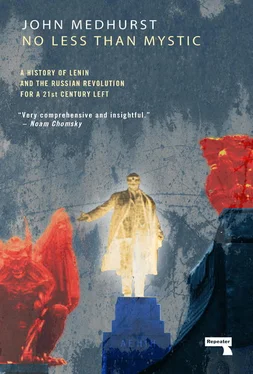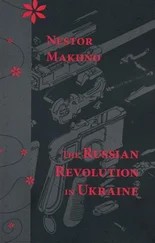A wave of resolutions from factories and army units welcomed the Vikzhel initiative. Bolshevik sailors on the destroyer Oleg broadcast via ship’s radio their relief at the “glad tidings” of negotiations between “all socialist parties who are trying to form a bloc”. 13A resolution passed by a large majority at the Baltic Shipbuilding and Machine Works in Petrograd on 2nd November declared:
Seeing the full horror of civil war, we decisively and insistently demand the immediate cessation of this bloody nightmare and the creation of a unified socialist authority based on understanding and mutual concessions by all the socialist parties, from the comrade Bolsheviks to the popular socialists.
It demanded that such a coalition government should carry out four urgent tasks: 1) approval of the Decree on Land, 2) immediate proposal for a democratic peace to all warring countries, 3) control over production and distribution, and 4) the convocation of the Constituent Assembly as scheduled. 14
The wishes of these workers were clear enough, but the very fact that talks were occurring, and at the behest of the militant trade union that had seen off Kornilov, gave hope to the Mensheviks and Right SRs who had walked out of the Second Congress that the Bolsheviks could not retain power. They therefore proposed a set of unrealistic demands: that a coalition be formed that excluded “the parties of privilege” (the Octobrists and Kadets) and the Bolsheviks, that the decisions of the Second Congress be declared null and void, and that attempts be made to negotiate a truce with Kerensky.
The hardline position of the Mensheviks and Trudoviks stemmed from their bruising experience at the Second Congress and the closure of their newspapers. Even Martov, desperate to reach an agreement between moderate Bolsheviks, Mensheviks and SRs, felt compelled to say clearly to the Bolshevik delegation that the Mensheviks could not agree with the latest Decree issued by the People’s Commissar for Justice. “We will not accept a decree which includes shootings and military revolutionary courts, i.e. executions without a trial”, he said. This condemnation of political terror was distributed as an official Vikzhel telegram to Petrograd workers. 15
Kamenev, leading the Bolshevik negotiating team, replied that any socialist coalition government that excluded them would not have majority working-class support. This was true for the moment although Riazanov, chairman of the Petrograd Trade Union Council, sensed that despite temporary support for Bolshevik actions on 25th October many workers supported the Vikzhel initiative. He therefore tried to accommodate the Mensheviks. At the same time he voiced his fears that disarmament of MRC units–currently fighting Krasnov’s troops outside Petrograd–would lead to a slaughter of workers by the regular army. He did not need to push this further as the MRC’s defeat of Krasnov at Polkovo altered the mood of the Menshevik and SR leaderships. They were also coming under heavy pressure from their own factory branches demanding they shelve differences with the Bolsheviks and form a coalition. The next Menshevik proposal on 31st October therefore agreed to a coalition with the Bolsheviks although it insisted this not include Lenin or Trotsky.
The Bolshevik representatives did not object to the exclusion of Lenin and Trotsky, and the talks soon produced a draft “agreement”. Its terms were plain–that a socialist coalition be formed with Victor Chernov, the long-standing SR leader, as Prime Minister; that although Lenin and Trotsky were to be excluded from the government the Bolshevik Party would have four senior ministerial portfolios (Labour, Commerce & Industry, Education and Foreign Affairs); and that the government be accountable to a new body, the Provisional People’s Council, with representatives from the Petrograd and Moscow City Dumas, the Trade Union Council, and the first (pre-26th October) Soviet Executive.
With the prospect of a solid agreement on the left and the avoidance of inevitable civil war and famine, the Bolshevik negotiators provisionally agreed these terms, with one reservation. Kamenev insisted that the current Soviet Executive, elected on 26th October at the Second Congress, should be represented on the People’s Council as it had the better mandate. Although this element of the agreement was left undecided, Vikzhel officials publicly announced that a final agreement was imminent. The bulletin of the Petrograd Soviet, Rabochii I soldat , controlled by the Bolsheviks, wrote in its editorial of 1st November that “agreement among all factions at the talks has been reached based on the principle that the government shall be composed of all socialist parties in the Soviet”. 16
This was premature. The Bolshevik Central Committee had not signed off on the agreement. On 1st November the CC met and an angry Lenin said he considered that Vikzhel was “on the side of the Kaledins and the Kornilovs”. Riazanov flatly disagreed. He argued that
Even in Petrograd, power is not in our hands but in the hands of the Soviet, and this has to be faced. If we abandon this course we will be utterly and hopelessly alone. We will be faced with the fact that we tricked the masses, having promised them a Soviet government. 17
Viktor Nogin, chairman of the Moscow Soviet, predicted any attempt to go it alone would result in civil war and the dissolution of the Soviets. Anton Slutski, representing the hardline Petrograd Committee, insisted that “the question of the Soviets” had been decided and that the Bolsheviks should not consider “broadened Soviets of any kind”. Lenin demanded that the Bolsheviks immediately withdraw from the negotiations. Despite this, the CC voted 10-4 to carry on with the talks, but with new conditions.
Lenin reacted as he always did when a democratic decision went against him. He immediately rejected it. Earlier in the day, at a stormy meeting of the Petrograd District Committee, he told those who argued for acceptance of the Vikzhel proposals, “If you get the majority, take power in the Central Executive Committee and carry on. But we will go the sailors”. By this he seemed to threaten that if the Bolshevik CC accepted the proposal and worked with the Soviet Executive, installed at the Second Congress after 25th October to create a socialist coalition government, he would ignore that decision and ask the Kronstadt sailors to overthrow the Soviet as well. But the Kronstadt sailors had supported the October Insurrection because it was an uprising in support of Soviet power. The policy of the Kronstadt Soviet was for a Sovietbased government of all the socialist parties, i.e. the kind of government suggested by Vikzhel and Martov. If Lenin had “gone to the sailors” and asked for their support for an exclusively Bolshevik government, he would have failed.
He never had to take that risk because he ensured the CC added pre-conditions to any final agreement which were sure to be unacceptable to the Mensheviks and SRs. On 1st November, the Soviet Central Executive debated the Vikzhel proposals. The Vikzhel spokesman Krushinsky began by asserting, “It is absolutely vital for all the socialist parties to agree on forming a homogeneous socialist administration”. Boris Kamkov, a Left SR, said that his party stood for a “homogenous revolutionary democratic government”. With counter-revolutionaries at the gates of Petrograd, “the socialist parties should set aside partisan calculation and close ranks to form a single progressive front”. The Left SRs held to their view that “the Soviets are the pivot around which revolutionary democracy can unite”.
The Bolshevik delegate Mikhail Volodarsky responded that they could not conclude an agreement “at any price”. He outlined the Bolshevik position in a resolution that demanded 1) the Decrees on peace, land and workers’control must be accepted before any coalition government be formed; 2) there must be a “merciless struggle” against counter-revolution; 3) recognition of the Second All-Russian Congress of Soviets as the sole source of authority; 4) any new government to be responsible to the CEC; 5) no organisation to be represented in the CEC not present in the Soviets; and 6) the CEC be expanded to include Soviets not currently represented. The Menshevik-Internationalists and Polish Socialists claimed the Bolshevik resolution was a “bolt from the blue” which prevented reaching agreement. In the heat of the debate nobody remarked that the Bolshevik resolution contradicted itself–that it demanded the Second Congress be the “sole authority” and that the government answer to the CEC while at the same time laying down conditions to the CEC to which it had to agree. 18
Читать дальше












